Parallax View
Literary rating: ★★★
Kick-butt quotient: ☆☆☆½
 This largely unfolds over the period of about a week in May-June 1987. History buffs will recall that being the time when the Soviet Union was beginning to fall apart, and it’s that which provides the background to the novel. President of the USSR, Mikhail Gorbachev is trying to shepherd his country into a more open era, but is facing strong opposition from some elements within the government. He writes a letter to his American counterpart, Ronald Reagan, whose contents are potentially explosive, and which the anti-Gorbachev faction in the Kremlin will do anything to stop. They fail to stop the communication being handed to American courier and CIA agent Tracie Tanner in East Berlin, but that’s only the start of their efforts to prevent Tracie completing her mission.
This largely unfolds over the period of about a week in May-June 1987. History buffs will recall that being the time when the Soviet Union was beginning to fall apart, and it’s that which provides the background to the novel. President of the USSR, Mikhail Gorbachev is trying to shepherd his country into a more open era, but is facing strong opposition from some elements within the government. He writes a letter to his American counterpart, Ronald Reagan, whose contents are potentially explosive, and which the anti-Gorbachev faction in the Kremlin will do anything to stop. They fail to stop the communication being handed to American courier and CIA agent Tracie Tanner in East Berlin, but that’s only the start of their efforts to prevent Tracie completing her mission.
This is the kind of book I liked despite its flaws – and there are quite a few of those. The plot really wouldn’t stand up to scrutiny: it’s the old “She can’t trust anyone” trope, and it’d take about five minutes of thought by a trained intelligence operative to figure out how she could bypass that. Meanwhile, Tracie has no qualms putting her complete faith in the male lead, hunky (but thoroughly doomed – he just found out he has an inoperable brain tumour) air-traffic controller Shane Rowley. No surprises for guessing where those two end up. Despite the period setting, there’s not much sense of that very specific era, and Leverone does spend too much time diverting into background information on characters who, in truth, are not more than fringe players. Finally, while it’s clear who the “bad guys” are, it might have helped if there had been a particular antagonist, rather than a series of relatively faceless Russian agents and American traitors.
However, you shouldn’t necessarily let any of the above dissuade you, since they are largely the kind of criticisms I only realized after I’d finished the book, and was contemplating this review. The author does a fine job of managing the pace, keeping things moving at a fast and furious rate. There’s one hurdle after another for Tracie and Shane to overcome, as they hurtle towards the final confrontation, atop a building in Washington. There are even occasional moments where I was genuinely impressed by Tracie’s smarts, such as her taking two motel rooms on opposite sides. Leverone has a very good eye for action, and some of the set pieces are positively cinematic, such as the fight on board a B-52, and its subsequent marginally controlled descent. Could quibble about the way Tracie needs “rescued” at the end, except it’s foreshadowed well enough to make sense.
All Enemies
Literary rating: ★★★½
Kick-butt quotient: ☆☆☆
 After finishing Volume 1, I was pleased to discover I’d been smart enough to pick up Volumes 1-3 as a freebie (you can also get the first seven books for ten bucks). Having been solidly entertained by the first book, I headed more or less straight in to the next two, figuring that it would be a good candidate for our first ever featured book review. I wasn’t disappointed. This is another slick page-turner, albeit one with some of the same issues as its predecessor.
After finishing Volume 1, I was pleased to discover I’d been smart enough to pick up Volumes 1-3 as a freebie (you can also get the first seven books for ten bucks). Having been solidly entertained by the first book, I headed more or less straight in to the next two, figuring that it would be a good candidate for our first ever featured book review. I wasn’t disappointed. This is another slick page-turner, albeit one with some of the same issues as its predecessor.
It begins only a couple of days after the events which ended the first volume. Traci is already back out in the field, even though she is still healing – both physically and mentally – from the damage she suffered while completing her mission.Only the personal intervention of President Reagan saved her from being drummed out of the CIA by Director Aaron Stallings, but it’s clear she is not exactly his flavour of the month.
A couple of months later, in September 1987, things kick off properly with the abduction of US Secretary of State J. Robert Humphries from his home in Georgetown. He’s a close personal friend of the President, who orders Stallings carry out an off-the-books operation, using a lone operative, to find out what happened and who’s responsible. No prizes for guessing to whom the director gives this fraught mission The initial evidence all seems to point to it being a Russian plot, this being the peak of the Cold War, but the more Tracie looks into the matter, the more it seems the Russians are being set up to take the fall, and the real culprits are elsewhere. Trying to tell Stallings this only gets her fired from the CIA; naturally, this is barely an inconvenience for the heroine.
As in the first book, the circumstances do throw Tracie back onto relying almost exclusively on her own talents. While she does get some help from CIA Analyst Marshall Fulton, it’s mostly information, which helps her put the pieces together. He’s a desk jockey, and although brave enough, ends up literally dropped off by the side of the road, as Tracie speeds off on her rescue mission. There is a slight sense of romantic tension between them; it doesn’t amount to much, yet still feels a bit awkward, considering how close we are to the personal tragedy Tracie endured in book #1. Her stoic refusal to call for back-up also felt a little strained. I get she no longer had official standing, yet there’s a point where this seemed a tad contrived.
It is a bit more of a stealth mission, which is what leads to the slightly lower kick-butt quotient for this: there’s more creeping around, trying not to be detected, in place of plane crashes, gun battles and chases. However, it feels more coherent and has a better ring of plausibility to it. Each piece of the story connects well to the next, and does a good job of drawing the reader along, towards the eventual climax on an small island off the East coast. My reading is usually split, with one book on my phone and a different one on the tablet. So it likely says something that, as soon as I finished this, I loaded up volume three on both my devices, the better to get into it.
The Omega Connection
Literary rating: ★★★
Kick-butt quotient: ☆☆☆☆
 Again, there’s no much of a pause between the end of one story and the beginning of the next. No matter how much Tracie may have been taxed by her exploits, she’s thrown back out there by boss Stallings, on another hazardous mission. I do wonder about her motivation, since she’s now entirely off-books, no longer even being a CIA employee: why love your country so much, and be prepared to put your life on the line for it, when its agencies treat you in such a disrespectful manner? I’d be high-tailing it towards the private security sector after all she’s gone through. That might just be me though.
Again, there’s no much of a pause between the end of one story and the beginning of the next. No matter how much Tracie may have been taxed by her exploits, she’s thrown back out there by boss Stallings, on another hazardous mission. I do wonder about her motivation, since she’s now entirely off-books, no longer even being a CIA employee: why love your country so much, and be prepared to put your life on the line for it, when its agencies treat you in such a disrespectful manner? I’d be high-tailing it towards the private security sector after all she’s gone through. That might just be me though.
This begins with an electronics company being decimated by a bomb attack, with its CEO also murdered in his hotel room. Threatening letters had been received, blaming the corporation for its role in the Bay of Pigs fiasco over a quarter of a century previously, an abortive invasion attempt against Fidel Castro’s Cuba, which cost the lives of many Cuban expats. Now, it appears, someone is out for payback. Tracey is assigned, first to bring in the only surviving member of the board, its R&D genius, Edison Kiley, then find out the person or persons responsible and make them stop. The task will take her into the darker corners of the expat community in Miami, over into Cuba itself, before she has to go deep into the almost unexplored territory of the Florida Everglades.
There is a certain sense of deja vu, in that as in All Enemies, the culprit for whom Tracie is seeking, is not who it initially appears. Neither book makes much effort to hide this fact: they’re not really whodunnits. However, it is a little too familiar for my tastes, and she also accepts what she is told regarding this by a certain party as the truth. While she is limited in what she can do, due to her unofficial status, I’d still expect her to be a little more “Trust, but verify…”
The best thing here is likely the main antagonist. They spend most of the film in the background, with Tracie dealing mostly with the results of their action. However, the eventual face-off is worth the wait, a downright brutal and savage brawl in the depths of the Florida swamps. It’s good enough to make me wish they’d met up earlier in the story, and had more than one such encounter. By the end, I’d be hard-pushed to say Tracie had shown much character development. She’s more or less in the same place she was at the start of volume 3 – just with a bullet wound in her leg, and a nasty concussion. However, the whole trilogy proved to be more than an adequately fun read, and I would not bet against further volumes showing up here, down the road.
Author: Allan Leverone
Publisher: Rock Bottom Books, available through Amazon, both as a paperback and an e-book
Books 1-3 of 9 in the Tracie Tanner Thrillers series.
 This has a fair amount in common with the disaster which was Interceptor. Both films were produced for streaming companies, and are about a sole woman in a remote military location, that is attacked by a terrorist or groups of terrorists. She then has to survive, take on the threat, deal with treachery on the inside, and handle a ticking clock scenario. It is fairly basic storytelling, occasionally dumb, and there’s nothing of note in either, we haven’t seen a hundred times before, with male or female leads. However, this is significantly more watchable, perhaps because it doesn’t push the envelope. One problem with Interceptor was its #MeToo messaging. There’s no such soap-box concerns here, and Black Site is better for it.
This has a fair amount in common with the disaster which was Interceptor. Both films were produced for streaming companies, and are about a sole woman in a remote military location, that is attacked by a terrorist or groups of terrorists. She then has to survive, take on the threat, deal with treachery on the inside, and handle a ticking clock scenario. It is fairly basic storytelling, occasionally dumb, and there’s nothing of note in either, we haven’t seen a hundred times before, with male or female leads. However, this is significantly more watchable, perhaps because it doesn’t push the envelope. One problem with Interceptor was its #MeToo messaging. There’s no such soap-box concerns here, and Black Site is better for it.




 This largely unfolds over the period of about a week in May-June 1987. History buffs will recall that being the time when the Soviet Union was beginning to fall apart, and it’s that which provides the background to the novel. President of the USSR, Mikhail Gorbachev is trying to shepherd his country into a more open era, but is facing strong opposition from some elements within the government. He writes a letter to his American counterpart, Ronald Reagan, whose contents are potentially explosive, and which the anti-Gorbachev faction in the Kremlin will do anything to stop. They fail to stop the communication being handed to American courier and CIA agent Tracie Tanner in East Berlin, but that’s only the start of their efforts to prevent Tracie completing her mission.
This largely unfolds over the period of about a week in May-June 1987. History buffs will recall that being the time when the Soviet Union was beginning to fall apart, and it’s that which provides the background to the novel. President of the USSR, Mikhail Gorbachev is trying to shepherd his country into a more open era, but is facing strong opposition from some elements within the government. He writes a letter to his American counterpart, Ronald Reagan, whose contents are potentially explosive, and which the anti-Gorbachev faction in the Kremlin will do anything to stop. They fail to stop the communication being handed to American courier and CIA agent Tracie Tanner in East Berlin, but that’s only the start of their efforts to prevent Tracie completing her mission. After finishing Volume 1, I was pleased to discover I’d been smart enough to pick up Volumes 1-3 as a freebie (you can also get the first seven books
After finishing Volume 1, I was pleased to discover I’d been smart enough to pick up Volumes 1-3 as a freebie (you can also get the first seven books  Again, there’s no much of a pause between the end of one story and the beginning of the next. No matter how much Tracie may have been taxed by her exploits, she’s thrown back out there by boss Stallings, on another hazardous mission. I do wonder about her motivation, since she’s now entirely off-books, no longer even being a CIA employee: why love your country so much, and be prepared to put your life on the line for it, when its agencies treat you in such a disrespectful manner? I’d be high-tailing it towards the private security sector after all she’s gone through. That might just be me though.
Again, there’s no much of a pause between the end of one story and the beginning of the next. No matter how much Tracie may have been taxed by her exploits, she’s thrown back out there by boss Stallings, on another hazardous mission. I do wonder about her motivation, since she’s now entirely off-books, no longer even being a CIA employee: why love your country so much, and be prepared to put your life on the line for it, when its agencies treat you in such a disrespectful manner? I’d be high-tailing it towards the private security sector after all she’s gone through. That might just be me though.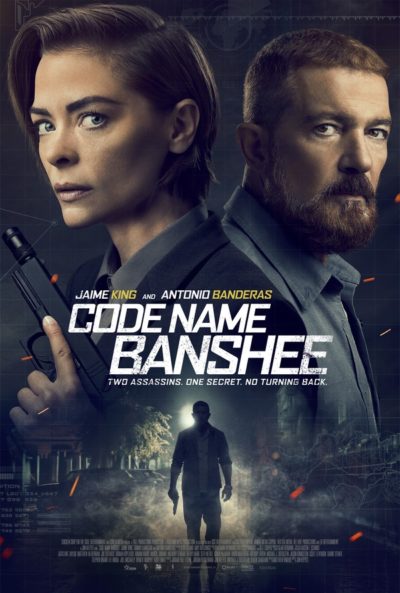 This looked considerably better in the trailer, which makes it look like quite an action-packed extravaganza. The reality is much less interesting, with a murky, and confusing plot, and what action there is, is often filmed in a murky and confusing way. It begins with an agent, code name Banshee (King), quitting the government agency for which she works. The handoff of an asset went wrong: one of the colleagues involved was her father, who vanished entirely. The other was Caleb (Banderas), who went off the grid thereafter. Five years later, Banshee is a private assassin, but her latest job is interrupted by Greene (Flanagan), who wants her to give up Caleb’s location.
This looked considerably better in the trailer, which makes it look like quite an action-packed extravaganza. The reality is much less interesting, with a murky, and confusing plot, and what action there is, is often filmed in a murky and confusing way. It begins with an agent, code name Banshee (King), quitting the government agency for which she works. The handoff of an asset went wrong: one of the colleagues involved was her father, who vanished entirely. The other was Caleb (Banderas), who went off the grid thereafter. Five years later, Banshee is a private assassin, but her latest job is interrupted by Greene (Flanagan), who wants her to give up Caleb’s location. 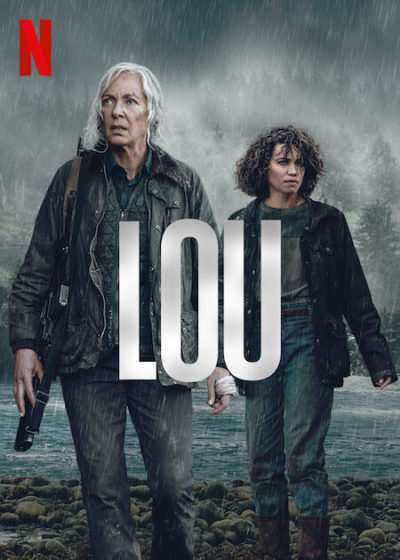 A Netflix original movie, the first thing to say is: thankfully, this is not as bad as
A Netflix original movie, the first thing to say is: thankfully, this is not as bad as 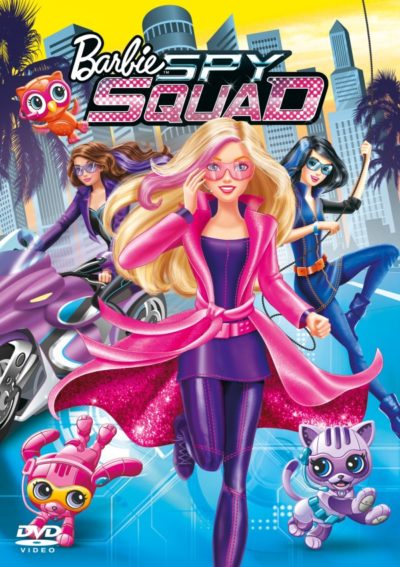 Ah, the things I watch for you people. Safe to say, this probably hit new heights of “I am not the target demographic”, but it’s hard to argue it is outside the remit of the site. To the film’s credit, this is not as bad as I feared it might be. If I had an eight-year-old daughter – such a shame this turned up about 25 years too late! – there would be far worse things to have inflicted on me. Not that I’ll exactly be chasing down any of the other
Ah, the things I watch for you people. Safe to say, this probably hit new heights of “I am not the target demographic”, but it’s hard to argue it is outside the remit of the site. To the film’s credit, this is not as bad as I feared it might be. If I had an eight-year-old daughter – such a shame this turned up about 25 years too late! – there would be far worse things to have inflicted on me. Not that I’ll exactly be chasing down any of the other  An obvious question readers might ask is, does reading this out of order result in “spoilers” for the earlier books? I would say no, because Modesty’s adventures are each episodic and self-contained; and she and sidekick Willie don’t significantly change, either in their life circumstances or in terms of character growth. Some characters here do appear in earlier books: Sir Gerald Tarrant, for instance, is already introduced in the first book, and Steve and Dinah Collier are in the story A Perfect Night to Break Your Neck, included in the story collection
An obvious question readers might ask is, does reading this out of order result in “spoilers” for the earlier books? I would say no, because Modesty’s adventures are each episodic and self-contained; and she and sidekick Willie don’t significantly change, either in their life circumstances or in terms of character growth. Some characters here do appear in earlier books: Sir Gerald Tarrant, for instance, is already introduced in the first book, and Steve and Dinah Collier are in the story A Perfect Night to Break Your Neck, included in the story collection 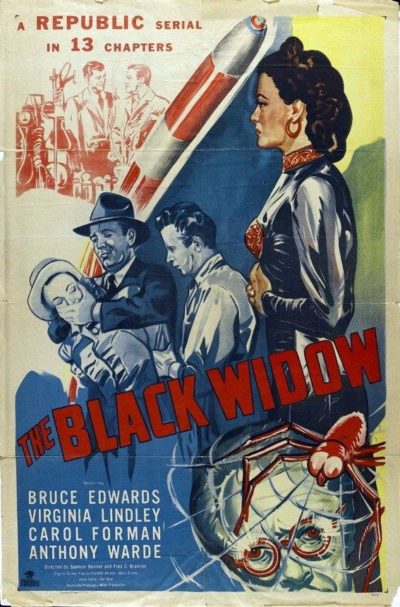 This is something of a fringe entry, and illustrates a few of the issues with Hollywood of the time. In particular, a severe reluctance to let female characters act with genuine independence. We see this on both side of the story here. The title character is Sombra (Forman), a vaguely Asiatic woman who is engaged in a plot to steal nuclear secrets from the United States. To this end, she has been trying to bribe acquaintances of a notable scientist, but the trail of spider-envenomed corpses resulting from their refusal to help has brought her to the attention of the Daily Clarion and its ace girl reporter, Joyce Winters (Lindley). Which would be fine, if the women were allowed to go head-to-head on their own terms, in the same way as
This is something of a fringe entry, and illustrates a few of the issues with Hollywood of the time. In particular, a severe reluctance to let female characters act with genuine independence. We see this on both side of the story here. The title character is Sombra (Forman), a vaguely Asiatic woman who is engaged in a plot to steal nuclear secrets from the United States. To this end, she has been trying to bribe acquaintances of a notable scientist, but the trail of spider-envenomed corpses resulting from their refusal to help has brought her to the attention of the Daily Clarion and its ace girl reporter, Joyce Winters (Lindley). Which would be fine, if the women were allowed to go head-to-head on their own terms, in the same way as  This probably falls into the category of lightly amusing, rather than anything more. But I can’t say I was ever bored, and it’s assembled well enough technically that I can’t complain. The heroine is Mi-Young (Uhm), a former North Korean agent, who defected, changed her looks through plastic surgery, and now lives a quiet existence, with a part-time job selling pastries in the local market. She’s married to Seok-Hwan (Park), a computer repairman, and their life is frugal as far as wealth goes. Seok-Hwan, however, is wins a promotion run by a soft-drink company, getting them and their young daughter a trip to Hawaii.
This probably falls into the category of lightly amusing, rather than anything more. But I can’t say I was ever bored, and it’s assembled well enough technically that I can’t complain. The heroine is Mi-Young (Uhm), a former North Korean agent, who defected, changed her looks through plastic surgery, and now lives a quiet existence, with a part-time job selling pastries in the local market. She’s married to Seok-Hwan (Park), a computer repairman, and their life is frugal as far as wealth goes. Seok-Hwan, however, is wins a promotion run by a soft-drink company, getting them and their young daughter a trip to Hawaii.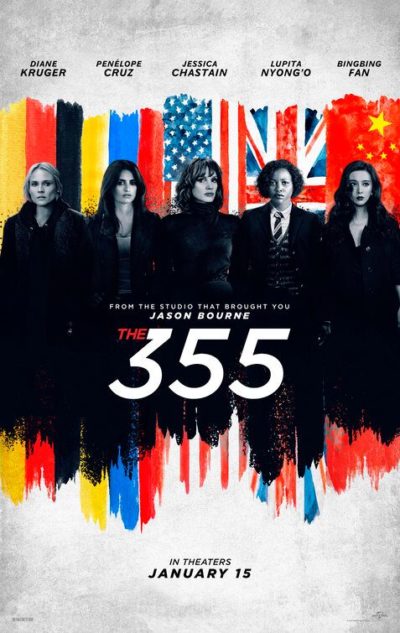 I went into this preparing to hate it. There had been red flags all over the place, such as star and producer Chastain coming out with comments about her movie like, “It’s very important for society. We’ve moved against the status quo, and we’re creating our own narrative for it. The film is, in some sense, a political act.” Uh-oh. No film is
I went into this preparing to hate it. There had been red flags all over the place, such as star and producer Chastain coming out with comments about her movie like, “It’s very important for society. We’ve moved against the status quo, and we’re creating our own narrative for it. The film is, in some sense, a political act.” Uh-oh. No film is 